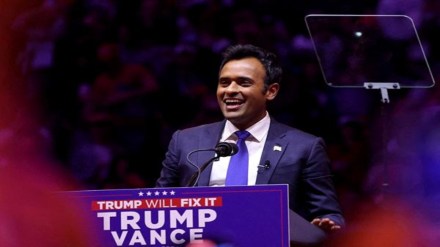Indian-American entrepreneur-turned-politician Vivek Ramaswamy and Tesla CEO Elon Musk have been tasked with heading the newly formed Department of Government Efficiency (DOGE) by President-elect Donald Trump. Their mission is to overhaul the federal bureaucracy by cutting jobs and streamlining processes in a bid to restore innovation and reduce costs.
A Bold Vision for Government Efficiency
Speaking at an event in Mar-a-Lago, Florida, Ramaswamy outlined his ambitious plan to reduce the size of the federal government. “Elon Musk and I are in a position to start the mass deportations of millions of unelected federal bureaucrats out of the DC bureaucracy. That, too, is how we’re going to save this country,” he declared.
Ramaswamy lauded Musk’s approach to problem-solving, saying, “Elon doesn’t bring a chisel. He brings a chainsaw. We are going to be taking it to that bureaucracy. It’s going to be a lot of fun.”
Ramaswamy’s Vision: America in Ascent
Ramaswamy rejected the notion that the United States is a nation in decline, offering an optimistic perspective instead. “With what happened last week, we’re back to being a nation in our ascent. A nation whose best days are actually still ahead of us,” he said.
He pledged a brighter future for younger generations, where meritocracy and freedom of expression thrive. “The best person gets the job regardless of their color. It’s going to be morning in America,” he emphasized.
Weekly ‘Dogecasts’ for Transparency
In a move aimed at maintaining transparency, Ramaswamy and Musk announced weekly livestream updates, dubbed “Dogecasts,” to keep the public informed about DOGE’s progress.
“Our goal is to shave the size of government and to be as transparent as possible with the public. Weekly Dogecasts will start soon,” Ramaswamy revealed.
Tackling Bureaucracy to Boost Innovation
Ramaswamy criticized the inefficiencies of federal agencies like the FDA and the Nuclear Regulatory Commission, which he argued stifle innovation and inflate costs.
“Too much bureaucracy means less innovation and higher costs,” Ramaswamy said. “They are utterly agnostic to how their daily decisions stifle new inventions and impose costs that deter growth.”
He compared their mission to a modern Manhattan Project, emphasizing the need to assemble the brightest minds to target the problem. “The major issue holding our country back is federal bureaucracy. Target that cost, save the money, restore self-governance,” he said.
Elon Musk’s Role in Reshaping Governance
Ramaswamy praised Musk’s reputation for disruptive innovation, noting his expertise will be crucial in reshaping federal governance. Together, they aim to deliver a government structure aligned with the vision of America’s Founding Fathers.
“DOGE’s job is to create a government of a size and scope that our Founders would be proud of. Elon Musk and I look forward to fulfilling the mandate given to us by President Trump,” Ramaswamy affirmed.
Criticism and Challenges Ahead
While their plans have been met with enthusiasm by some, others are skeptical about the feasibility of such drastic changes. Critics argue that slashing federal jobs could lead to significant pushback from labor groups and create disruptions in essential services.
Ramaswamy and Musk face the dual challenge of delivering on their promises while addressing the concerns of stakeholders who view bureaucracy as a necessary component of governance.
A Radical Overhaul on the Horizon
The appointment of Ramaswamy and Musk to lead the Department of Government Efficiency signals a bold shift in federal governance. Their plan to cut jobs, reduce costs, and promote innovation could redefine the role of the federal government in the 21st century.
Whether they succeed in their ambitious mission remains to be seen, but their combined influence and vision promise to leave an indelible mark on American bureaucracy.
